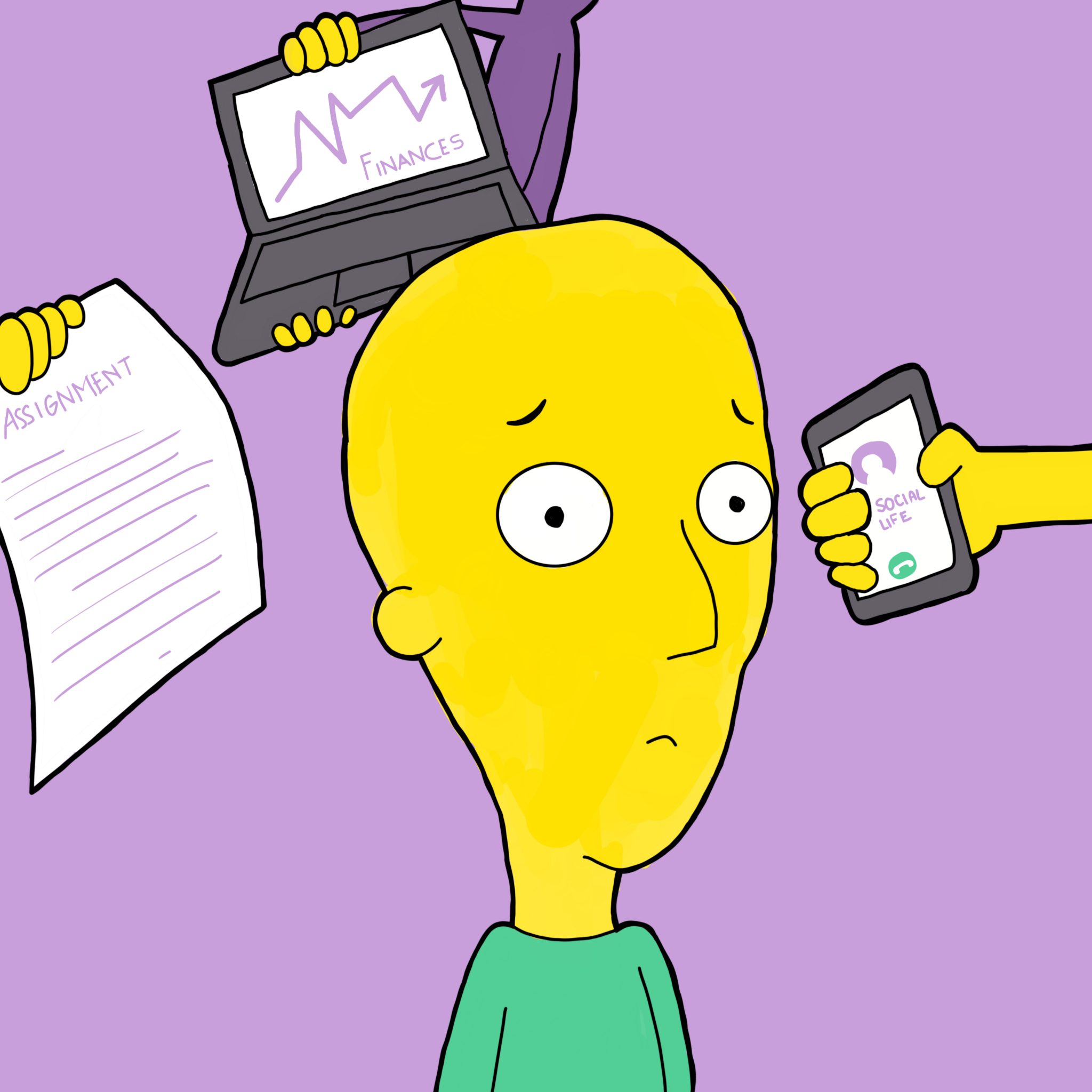Let’s stop glamourizing burnout!

The world runs on a tight schedule that doesn’t fit us. At the supposed peak of our civilization as a human society, we find ourselves constantly pushed to points of extreme stress without ever taking truly beneficial breaks.
We know first-hand how harmful burnout is, yet we continue to cope with it instead of finding alternative ways of living. Without understanding the consequences of glorifying burnout, we, as students, can easily become overwhelmed with stress when starting a new school year.
This stress doesn’t merely come from overwork, but from over socialization too, both of which are taught to be natural and desirable aspects of life.
How often do we find ourselves torn between getting work done, hanging out with friends and taking time to ourselves to recharge?
These are all important parts of life, yet the persuasiveness of our work environment and social pressure trivialize time off and simplify the meaning of self-care. The term is boiled down to images of hot baths, smoothies and candles. In reality, it is not acknowledged enough that taking a bath won’t fix serious burnout.
In fact, burnout is not viewed as something to be fixed, but is instead twisted into something to strive for. Being overstressed is often equated with hard work and success.
On the other hand, having little to no stress means there is something wrong with us, that we are not being productive workers turning the gears of capitalism. The glamourization of burnout feeds into the fear of not being burnt out.
This kind of burnout can become intense in contexts where the lines between work life and social life are blurred. Many students, including myself, understand the challenges of balancing school and friendships. While those of us in school may often have the motivation to take on such challenges and participate in both social and working activities, it is also very easy to forget about our real needs in the process.
We believe the worst will happen if we don’t submit to our full duties in our careers or social lives. The fear of missing out (or FOMO, as it is commonly known) is often what keeps many from leaving an otherwise draining situation.
But what would happen if we did miss out?
In reality, it wouldn’t be the end of the world. We might lose a few points from our friends and co-workers. In the long run, our lives would be the same- save for a healthier mindset. The challenge is achieving that healthier mindset in the first place, and the largest obstacle is the stigma around seeking help and taking time for ourselves.
Being able to decline social invitations and work pressures on one’s own is a courageous step, but there is a larger support system needed to consistently make such choices. Not only do the relevant mental health resources need to be accessible, but such a transformation also necessitates a general social acceptance of “unproductivity”.
Take academic institutions for instance: Even at schools fortunate enough to possess mental health resources, students hesitate to use such tools as accessing therapy or any form of counselling to treat burnout is seen as excessive.
Because burnout is such a frequent occurrence, students get the message that it’s merely a part of the productivity of life and we need to handle it ourselves. It’s never acknowledged that being a “productive” human being doesn’t necessitate constantly collapsing under stress or having to deal with our challenges alone.
At this point, useful mental health resources for anxiety, stress and burnout are not so commonplace as being unstigmatized.
This guilt around seeking help and taking breaks is intense in most settings and prevents us from taking care of ourselves. So, not only do mental health resources need to be available and accessible to everyone but they must be seen as socially acceptable and essential for one’s well-being.
What can be done easily to combat burnout occurs on an immensely personal level. It involves self-awareness and self-respect alongside a willingness to stray from the norm and defy common beliefs.
Of course, we aren’t going to stop working entirely. But by following our own principles when it comes to burnout, we also create a new standard for those around us.
Currently, the standard is going to break us.
We know that this over-productive, capitalist view of the world is not sustainable nor realistic. However, it has become an unspoken rule. It’s not our own fault, we’ve simply been conditioned in a society that values time and money over all else.
But to be able to penetrate past the tight-looming bounds of burnout, we have to realize that there is always a choice between society’s values and our own. To preserve our mental health, we need to start choosing ourselves.


